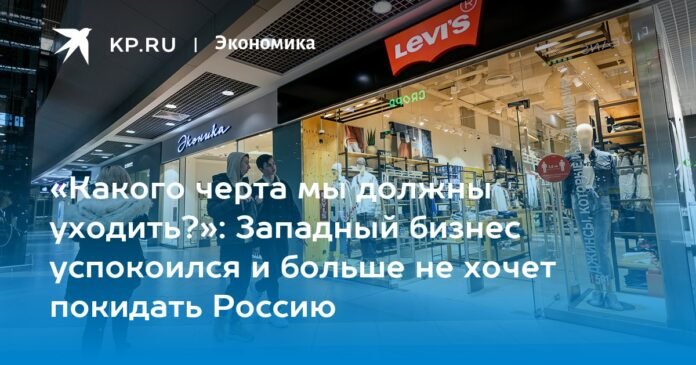Foreign companies no longer want to leave Russia
Photo: Valery ZVONAREV.
“Western companies are abandoning their plans to leave Russia. Companies such as Avon Products, Air Liquide and Reckitt remain in the country.” Today an interesting article appeared in the Financial Times with this headline. The British write that many large Western companies have remained in Russia, although they had already announced their departure. There are two reasons: “bureaucratic obstacles are growing, but consumer activity is recovering.”
“Many European companies find themselves between a rock and a hard place,” the publication quotes one of the executives who work with Western companies in the country. – They said they would leave. “They were given a choice of buyers that they found unacceptable.” Analysts estimate that since 2022 more than 2,100 transnational companies have remained in Russia, 1,600 have left and 1,200 are in the pipeline. And they have something to think about.
The publication writes: “A second executive who works with Western companies in Russia said there had been a notable shift in sentiment. While companies that left in the CBO’s first weeks saw a moral imperative, he said: “The current wave is more about asking: Is it really necessary to leave? Do you want to go? Some of these companies have built four or five factories in 30 years. “They’re not going to sell it at a 90 percent discount.”
YOU CAN’T LEAVE, YOU CAN’T STAY
Speaking of discounts. Let us remember what conditions Russia proposed for Western companies to leave our market.
1. For the sale of Russian assets of foreign companies in some sectors (banks, energy), permission from the Russian authorities is required.
2. If such permission is granted, then with one mandatory condition: the business must be sold at at least a 50 percent discount plus pay an “exit tax” of 15 percent.
And at the same time, as the Financial Times writes, “it is becoming increasingly difficult to find local buyers acceptable to both the seller and Moscow.”
But it was not just the restrictions that influenced the “changes in sentiment.” Below are some examples offered by the Financial Times.
Air Liquide, a global producer of technical gas, announced in September 2022 the sale of Russian assets. However, the Russian government never approved the deal, leaving the company in limbo.
Cosmetics giant Avon tried to leave but decided to stay, saying: “For more than 135 years, Avon has supported women wherever they are, regardless of their ethnicity, nationality, age or religion.”
Household chemicals maker Reckitt was about to launch in April 2022, but then decided to think about it. That’s what he still thinks. And apparently he will change his mind. After all, the current economic situation “has made Russia much more attractive to multinational corporations, especially in the consumer sector.” In addition, there is a risk of nationalization of Russian assets of Western companies in the event of withdrawal. So why take the risk?
Here is another interesting example. PepsiCo announced in March 2022 that it had suspended the sale and production of its flagship beverage, Pepsi Cola, in Russia. However, “a dairy business still continues to operate in the country that directly employs 20,000 people and indirectly 40,000 agricultural workers.” PepsiCo nobly explains its decision to continue its business in the Russian Federation: “As a food and beverage company, now, more than ever, we must remain true to the humanitarian aspect of our business. This means that we are obliged to continue offering our other products in Russia.”
The management of the American confectionery company Mondelez (Oreo, Halls, Milka, Tuc brands) stated that investors “are not morally concerned” about leaving the Russian market. Nelson Peltz, a member of the board of directors of the cosmetics company Unilever, put it even more harshly: “If we leave Russia, they will keep our brands. I don’t think this is a good deal. Why the hell should we do this?
RELUCTANTLY
In general, the situation is obvious. Emotions have subsided in the last two years, common sense and cold calculation have entered the picture, and restrictions have cooled the desire to slam the door.
“In 2022 they were convinced that Russia would be defeated and they urgently needed to flee,” explains the director of the Socioeconomic Research Institute of the Financial University of the Government of the Russian Federation, economist Alexey Zubets. “Now it is clear that a defeat is not expected. On the contrary, the development of Russian industry has only accelerated. GDP is growing (3.6% by 2023). That is to say, our market is increasingly attractive. And here we must also understand that the departure of Western companies from Russia is a function of pressure. When there was strong pressure from local governments, they left. No one would leave of their own free will. And if the foreign government does not put pressure, the business remains. Otherwise, factories, capacities and profits will be lost.
The director of the Market Research Center of the Higher School of Economics, Georgiy Ostapkovich, calls not to jump to conclusions for now. After all, different companies behave differently.
“The Russian market, although small (our share in world GDP is 2.5%), is attractive and profitable,” says Georgy Ostapkovich. – Each company is guided by its own interests. Those who could quickly find options to compensate for the loss of profits left. And those who have a decent market size in Russia will not leave. Furthermore, the geopolitical situation is very uncertain.

